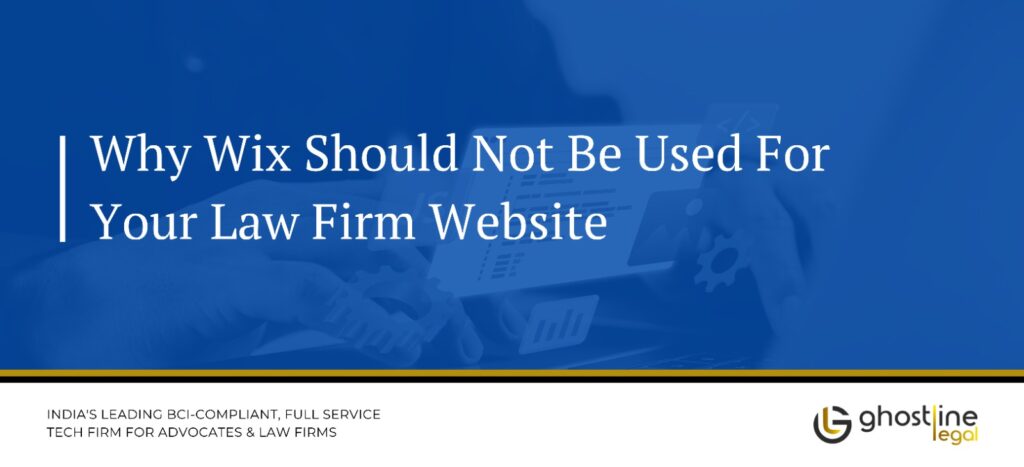In today’s digital age, establishing a robust online presence is paramount for businesses across various industries, including law firms. A well-designed website serves as a crucial tool for attracting potential clients, showcasing expertise, and building credibility. However, when it comes to selecting the right platform to build and manage a law firm website, not all options are created equal.
While Wix may seem like an accessible and cost-effective choice, there are significant drawbacks and limitations that make it unsuitable for law firms looking to thrive in the competitive online landscape.
As a firm, we have consistently discouraged potential clients from using Wix as a platform for their law firm website. In fact, most of the revamp projects that we take up are law firms requesting us to shift their current website to a better platform that works more effectively.
In this article, we give you an overview on why you should look beyond Wix for your law firm website. Read on!
1. Lack of Customization and Professionalism
One of the primary concerns with using Wix for law firm websites is the limited customization options and cookie-cutter templates. While Wix offers a range of pre-designed templates, many of them lack the sophistication and professionalism required for legal services. Law firms have unique branding needs and must convey trust, authority, and credibility to potential clients. However, Wix’s templates often fall short in terms of customization flexibility, making it challenging to create a website that reflects the firm’s brand identity and values effectively.
2. Limited SEO Capabilities
Search engine optimization (SEO) plays a crucial role in ensuring that a law firm website ranks well in search engine results and attracts organic traffic. However, Wix’s SEO capabilities are notoriously limited compared to other website-building platforms. Wix’s proprietary website structure and coding can hinder SEO performance, making it more difficult for law firms to improve their visibility online.
Basic SEO features, such as customizable meta tags, structured data markup, and URL structure optimization, are either lacking or inadequate in Wix, which can significantly impact a law firm’s ability to compete effectively in search engine rankings.
3. Subpar Performance and Loading Speed
In the digital realm, speed matters. Studies have shown that website visitors have little patience for slow-loading sites, with a significant percentage abandoning a page if it takes more than a few seconds to load. Unfortunately, Wix websites tend to suffer from performance issues and slower loading speeds compared to sites built on other platforms.
The drag-and-drop nature of Wix’s website builder often results in bloated code and inefficient resource loading, leading to sluggish performance that can frustrate visitors and drive them away. For law firms, whose websites serve as a critical point of contact with potential clients, poor performance can have detrimental effects on user experience and conversion rates.
4. Limited Integration and Scalability
As a law firm grows and evolves, its website needs to adapt and scale accordingly. However, Wix’s limited integration options and scalability make it challenging for law firms to expand their online presence and incorporate advanced features and functionalities. Integrating third-party tools, such as client intake forms, appointment scheduling systems, or CRM software, may be cumbersome or impossible with Wix, restricting the firm’s ability to streamline operations and enhance client engagement.
Additionally, Wix’s platform may lack the flexibility to accommodate future changes or expansions in the firm’s service offerings, resulting in potential roadblocks to long-term growth and success.
5. Concerns Regarding Data Ownership and Control
In today’s data-driven world, concerns about data ownership and control are paramount for businesses of all sizes. When using Wix’s platform, law firms may face limitations on data ownership and control, as the company retains certain rights over the content hosted on its servers. This lack of autonomy can be concerning for law firms that handle sensitive client information and must adhere to strict confidentiality and privacy standards.
Additionally, reliance on a third-party platform like Wix raises questions about data security and compliance with industry regulations, potentially exposing law firms to legal and reputational risks.
Conclusion
While Wix may offer a user-friendly interface and affordable pricing plans, its limitations and drawbacks make it an unsuitable choice for law firm websites. From lackluster customization options and subpar SEO capabilities to performance issues and scalability concerns, Wix fails to provide the robust features and functionalities that law firms need to succeed in the competitive online landscape.
Instead, law firms should consider investing in professional website development services or opting for reputable website-building platforms such as WordPress or PHP that offer greater flexibility, customization, and performance optimization options. By making an informed decision and choosing the right platform for their online presence, law firms can effectively showcase their expertise, attract clients, and thrive in the digital age.
Looking for a trusted website developer for your law firm? Ghostline Legal can help. We have already done this for 300+ law firms pan-India and would love you to be our next. Get in touch with us HERE.










